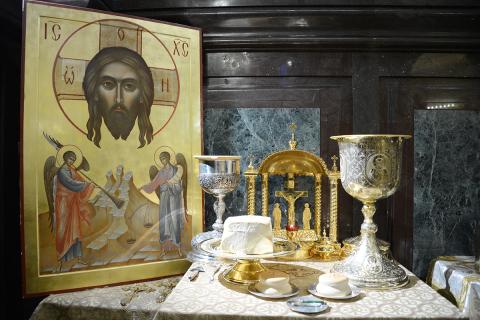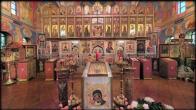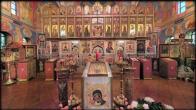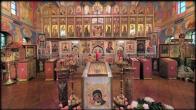You are here
Notes on the Liturgy & the Church

by Sergei Fudel
Chapter 2
The Liturgy is at the center of Christianity, and in the center of the Liturgy is the "Lamb, slain from the foundation of the world" (Revelation 13: 8), or as stated at another point [in the Scriptures], "Who verily was foreordained before the foundation of the world." (I Peter 1: 20). Of course, those words are beyond our comprehension, but we cannot simply pass them by. The Mystery of Christianity begins with the question of its origin. St. Symeon the New Theologian wrote, "He [God] is known to us to the same degree that someone is able to see the boundless sea while standing on its shore at night with a small lighted candle." It is difficult, even for a mind illumined by grace.
However, our difficulty in comprehending the Divine world is not a basis for rejecting what we cannot or will not comprehend. St. Basil the Great writes, "If we measure everything with our [intellectual] understanding, and come to conclude that whatever is incomprehensible to reason does not exist at all, the reward of faith will perish. What else can render us worthy of the benefits announced to us on condition of our belief in the invisible?" Rational faith, faith governed by reason, is Apostolic faith, but rather remains that same Kantian "religious [faith] within the bounds of reason alone," for which everything is comprehensible or must be comprehensible, one which in our day strives to fashion a faith adaptable to lack of faith, a Christianity that overall raises no objection to non-Christianity.
Beginning in the 1st Century, many saints sensed Christianity's divine pre-existence. St. Dimitry of Rostov wrote, "This salvific name, Jesus, was already prepared before all ages, in the Council of the Trinity. The power of the name of Jesus in the Pre-eternal Council, was hidden, as in a vessel." During the reading of the Epistle for the Feast of the Annunciation, the Reader exclaims, "His Name shall continue longer than the sun." (Verse 2 of the Alleluia - Ed.), i.e., on the same day that we sing, "revealing to thee the pre-eternal counsel, O Maiden" (sticheron for "Lord I have cried…"), when we commemorate the Angel's bringing of the human name of Jesus from Heaven to the Most-pure Virgin (Luke 1: 31).
Bishop Theophanes the Recluse wrote the following regarding St. Paul's pronouncing the judgment of the Church that "great is the mystery of godliness" (I Timothy 3: 16), resting in the fact that "God was manifest in the flesh" (loc.cit.) and that of this Flesh, the Body of God, the Church was made: "The substance of our faith is hidden and so by reason of its being beyond comprehension, is its action within us. It (the mystery of godliness) was engendered in the Mystery of the Tri-hypostatic God, before all ages." Only by understanding the Church as having been created "before all," (St. Hermas), as being the 'Wisdom of God, a secret, hidden Wisdom that God foreordained for our glory before the ages' (I Corinthians 2: 7), is it possible to actually believe in it. We are given to believe in it not as a human organization, but only as a Divine-human Being, with its origin in Divine existence before time."
However, first and foremost, the Church is the Liturgy. Therefore, the Liturgy is eternal. The Lamb is pierced and sacrificed in the bosom of the Holy Trinity (Archimandrite Cyprian Kern).
Metropolitan Nicholas Cabasilas (XIV C.) wrote that all liturgical action is as the one image of the One Body and Kingdom of the Savior (i.e. the Church)... The Church is shown in the Mysteries not as symbols, but as the heart shows the members, the body, like the roots of a tree, outgrowths and, as the Lord said, like branches of the grapevine; here is not mere similarity of name or analogous appearance, but identity of matter, for the Mysteries are the Body and Blood of Christ." He also wrote, "If one could see the Church of Christ in its real aspect, that it is united with Christ and participates in His Body, he would see it as nothing less than the Body of the Lord." St. Ignatius the God-bearer describes the Liturgy as follows: "The Eucharist is the Body of our Savior Jesus Christ, Which suffered for our sins." The Church exists in that "God appeared in the flesh," in a suffering human body; the Church is the Incarnation of God. Without abandoning His Divine Being, He entered the world, in human being/nature. Christian history began from this, and its entire substance is emulation of Him, of this going out of God, but only in a reverse process: God comes down from Heaven to earth, and becomes man, while in Christianity, man goes out of his humanity to meet his God; he goes out of his "too human" being into the world of the Divine. The ordinary and constant formulation [expressed by] the Saints is, "God became man, that man might become God."
The Saints teach that man exists in three states: the natural state, the unnatural or sinful state, and the supernatural or spiritual state.. The Christian first of all does battle with sin, sin pulling him into the pit beneath his nature. Only sin is contrary to man's nature. Speaking of the supernatural, the Church affirms that the supernatural is not contrary to nature, that it merely surpasses or goes beyond the natural. And Christianity is not only a battle with the unnaturalness of sin, but also a challenge to overcome the earthly "natural state" and to go "beyond nature" to "the supernatural." In general, in following our "nature" we want only to eat, drink, sleep and enjoy ourselves. However, Christianity calls us to a new birth in the Holy Spirit, not to an allegorical birth, but to a quite painful one. In the Gospel, it states, "A woman when she is in travail hath sorrow, because her hour is come…." Elsewhere it states, "And she, being with child cried, travailing in birth, and pained to be delivered." (Revelation 12: 2). Only love for God gives us the strength and joy to pursue [those labor pangs]. That birth of spirituality is a mystery to us, and that is precisely what scares off people. Christ said to Nicodemus "You must be born from above," and Nicodemus was frightened by those words. A righteous man and a lawyer, he immediately understood that this was more than a talk about the battle with sin, and anyone who has not taken the step, to even the slightest extent, into the supernatural, has not yet begun [the Christian journey]. However, that interior overcoming of nature, the overcoming on which rests all Christian podvig, i.e. of the everyday occurrences in Christian life, is merely "the sun in a tiny drop of water." All Christianity rests in the original, supernatural nature of the Divine Incarnation. The Church sings in the 9th Song of the Canon for the Dormition of the Virgin and Mother "In thee, O Virgin without spot, the bounds of nature are overcome: for childbirth remains virgin and death is betrothed to life…"
“The bounds of nature are overcome" as well in the origin of the Church before all time, and just as God's becoming man is incomprehensible to us, so "beyond comprehension" for us is the Church. "D. Khilkov writes, "Body and blood" cannot impart to us knowledge and faith regarding the Church, just as once "flesh and blood" could not impart understanding that the carpenter from Nazareth was the Son of the Living God." We take little note of the point in the Gospels that provides us a revelation of the Church (see Matthew 16). It turns out, that all of that revelation about the Church was given only after it had been revealed that man was capable of living not merely in his own nature: "Blessed art thou, Simon Bar-Jona: for flesh and blood hath not revealed it (the mystery of the Incarnation - S. F.) unto thee, but My Father which is in heaven. And I say also unto thee, that thou art Peter, and upon this rock I will build my church; and the gates of hell shall not prevail against it." (Matthew 16: 17-18). "The bounds of nature are overcome" in the Eucharist as well. Priest Pavel Florensky writes: "Partaking of Christ in the Mystery of the Holy Eucharist is the source of all spiritual joy." "The Mystery is the Divine act of partaking of the Kingdom on high." "As in the earthly life of Christ, partaking of the Life Above was accomplished by means of the Savior's human nature, just so now the visible partaking of that life is accomplished by means of the visible and tangible human nature of the Body of Christ.”
And if the Church pre-ordained in the Council of God even before the existence of the world is incomprehensible to us, then the very same applies to its center, the Liturgy. St. John of Kronstadt writes, "The Life-giving Trinity deigns to permit the performing of the life-giving Mysteries, foreordained from the formation of the world." That is why, most of all at the Liturgy, we so clearly feel blessed and loving eternity, warm as a mother's bosom. That is why at the Liturgy we breathe the air of an entirely different world.
In the Apostle's words, "Creation still cries out and travails," but the seed of immortality has already dipped into the world and the faithful, standing at the Liturgy, already know that death has been 'swallowed up by victory."
PARISH LIFE
RECENT VIDEOS
Address of our Cathedral
Subscribe to our mailing list
While all the materials on this site are copyrighted, you may use them freely as long as you treat them
with respect and provide attribution on the Russian Orthodox Cathedral of St.John the Baptist of Washington DC.









